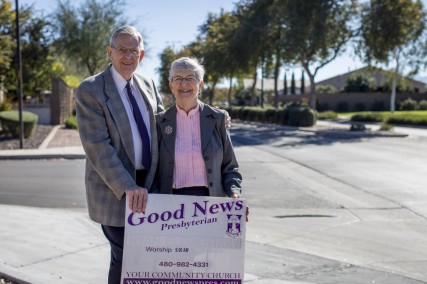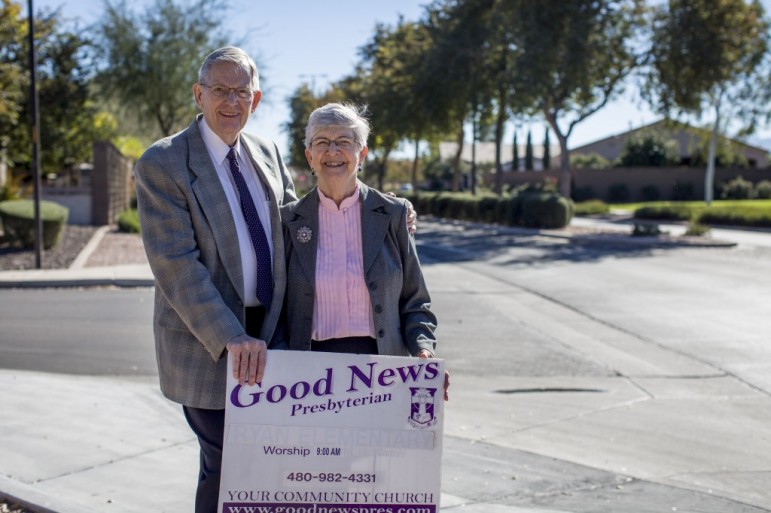
Arizona couple Pastor Clyde and Ann Reed of Good News Presbyterian. Photo by Alliance Defending Freedom
Written with Daniel Bennett
Yesterday, the U.S. Supreme Court ruled in a free speech case that was also a victory for religious freedom advocates. It was the second win for religious freedom advocates this year.
Reed v. Town of Gilbert centers on Gilbert, Arizona, a suburb of Phoenix. At first glance, the case seems mundane. Gilbert categorizes signs directing people to events—including church services—differently than signs with ideological, political, or commercial content.
For example, a political sign cannot exceed 32 square feet and may be left up for a few months. But a sign inviting people to a church event cannot exceed six square feet and may only be displayed for several hours.
So why are religious freedom advocates interested? Good News Community Church and its pastor, Clyde Reed, repeatedly violated the ordinance. Their signs directed people to their building, which they rent from a local school.
Alliance Defending Freedom (ADF), the Christian conservative legal group defending Reed, argued treating Good News’ signs different than other signs amounts to content-based discrimination on speech. The courts routinely strike down content-based speech laws.
For its part, the town suggested Reed and ADF have exaggerated the issues in the case, while also claiming the restrictions are content-neutral since they apply to all “temporary directional signs,” regardless of message.
The court ruled unanimously in favor of the church, but they were split over why the sign ordinance was unconstitutional. The majority decision, written by Justice Clarence Thomas, agreed with ADF that free speech should be protected, even overprotected.
ADF’s David Cortman, who argued on behalf of the Reed’s, said the ruling ensured that government continued to treat all speech the same regardless of content.
“Speech discrimination is wrong regardless of whether the government intended to violate the First Amendment of not, and it doesn’t matter if the government thinks its discrimination was well-intended,” Cortman said. “It’s still government playing favorites, and that’s unconstitutional, as the Supreme Court today found.”
Justices Kagan, Breyer, and Ginsburg offered concurring opinions. They agreed with the judgment, but they said the majority ruling goes too far in setting a standard that could overturn other ordinances, that unlike this one, were reasonable.
This is the second case this session that the court has ruled in favor of religious freedom advocates. Earlier this year, the court ruled that a prisoner has the right to grow a beard for religious reasons. The court unanimously ruled that the religious liberties of prisoners must be protected. A prison must be able to show that restricting a religious exercise is necessary and is the least restrictive way to achieve a prison’s need.
Both cases attracted a diverse coalition of supporters including the U.S. government, numerous First Amendment scholars, and the Becket Fund for Religious Liberty.
This post includes portions of earlier posts. Daniel Bennett (@bennettdaniel).researches the conservative legal movement. He is a professor of political science at Eastern Kentucky University.





